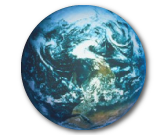Many humans believed that the earth was flat because the naked eye cannot see the curvature of the horizon. The same can be said about a nearly invisible single strand of virus that is potentially stronger, more powerful, more adaptable than our strongest muscleman.
What was just said sounds silly, perhaps even absurdly mundane. Placing that level of importance on a lower life form over the most advanced species on earth would be dismissed simply as quackery. Humor, for a brief moment, what earth's current demeanor really has in store for the current model of the human species. Surely, silly speculations are easily dismissed, but consider that Albert Einstein's theories came to him in his dreams. As humorous as it may sound, by the end of this article, you will be wishing you payed attention to that guy parading at the street corner holding a sign stating "The End is Near."
One such respectful town crier in the form of Dr Nafeez Ahmed, Research Fellow at the Schumacher Institute, pragmatically states "The COVID-19 crisis is an urgent early warning signal for how industrial civilization is rapidly eroding the very conditions of its own existence.”
Endless scientific studies repeatedly point to the same end game scenario, where a rise above 3° C, equivalent to 37.4° F, will bake the planet extra crispy. How you say? Let's explore the scientific facts that explain the consequences of the global economy and our current state of chronic instability.
The probability of a global pandemic was dramatically increased by relentless and unregulated industrial expansion, which has destabilized ecosystems critical for planetary life-support. The same processes are driving other ecological crises which threaten to permanently undermine the health of the global economy. Reinforcing Dr. Ahmed's findings, Dr. Aaron Bernstein, Director of Harvard Chan C-CHANGE, explains how a destablized ecosystem alters how we relate to other species and the opportunity for SARS-2 based viruses to evolve, he states "As the planet heats up, animals big and small, on land and in the sea, are headed to the poles to get out of the heat. That means animals are coming into contact with other animals they normally wouldn’t, and that creates an opportunity for pathogens to get into new hosts."
The components of a destabilized eco-system; deforestation, loss of habitat, carbon dioxide emissions, species extinction, polluted and piosoned water sources, over-population are the very same ingredients for such conditions giving rise for COVID-19 to dictate our global economy and our bumbling reaction and relationship to all other segments of the eco-system. This is earth's new reality, not just an epidemic, but a runaway world-wide pandemic, larger than previous pandemics in relation to the context of the world being in the "advanced" modern age.
As Dr. Ahmed coins our current state of affairs: "humanity faces a heightening risk of cascading breakdowns across interconnected social, economic and political systems. Without a transition to a lifeboat economy, markets cannot be recalibrated to protect public health and natural systems." Meaning, humans lose, the virus wins.
Sources:
https://nen.press/2020/11/15/pandemic-signals-breaching-of-planetary-tipping-point-by-global-economy-says-eu-adviser/
https://www.hsph.harvard.edu/c-change/subtopics/coronavirus-and-climate-change/
Image courtesy of Town of Princeton, North Carolina (https://www.myprincetonnc.com/covid19).

